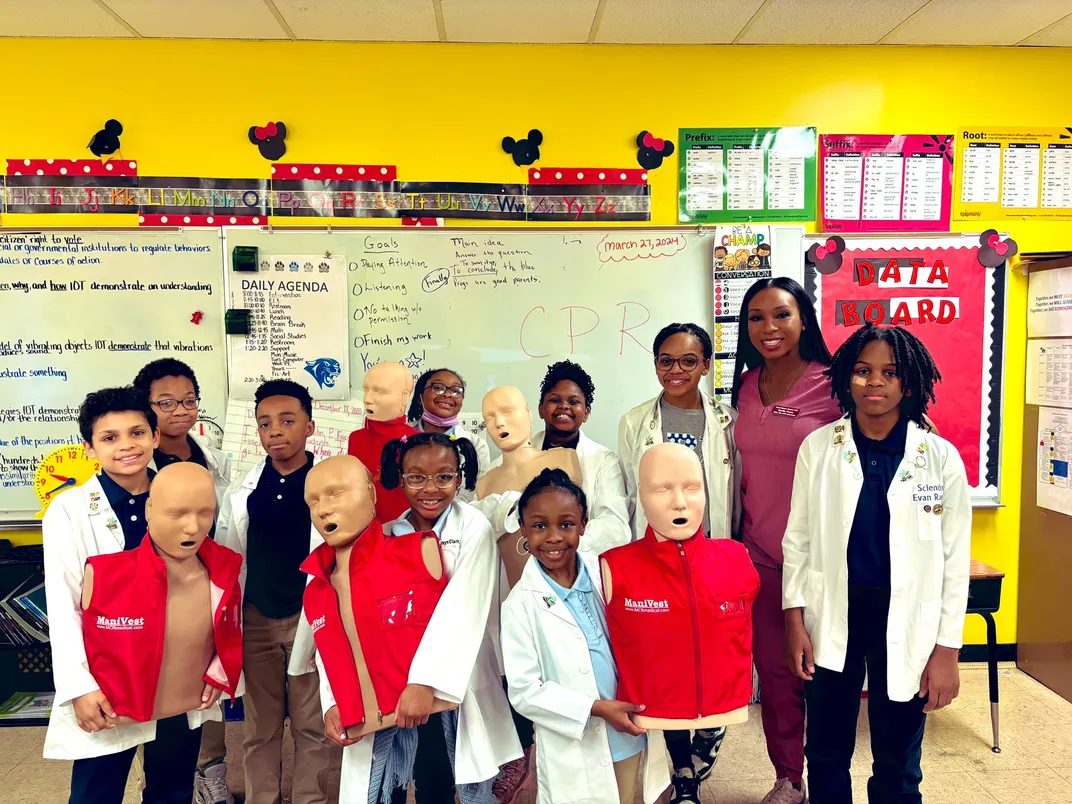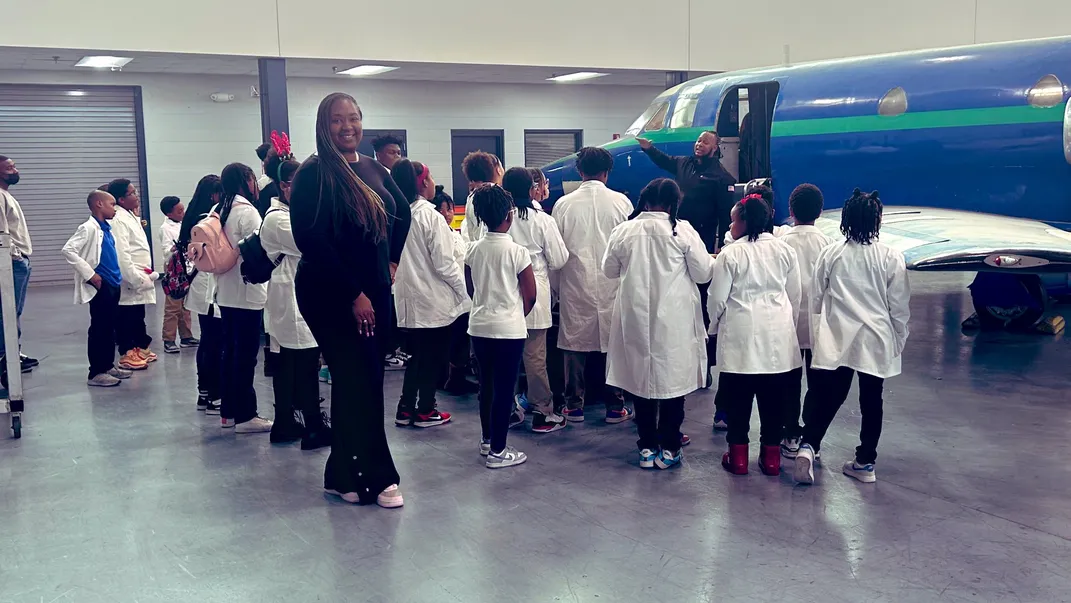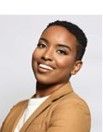The Power of a Teacher Who Dreams Big
In an interview with the Smithsonian Science Education Center, Dr. Melissa Collins, a veteran elementary school teacher shares her wisdom and expertise in supporting students with access to STEM opportunities and helping them imagine new possibilities for themselves
:focal(2760x720:2761x721)/https://tf-cmsv2-smithsonianmag-media.s3.amazonaws.com/filer_public/e2/4e/e24ee72b-73a8-4a7e-97b8-15ba69799de9/melissacollins1.jpg)
Every student deserves a champion who inspires them to dream big. Dr. Melissa Collins, a veteran elementary school teacher, and recent recipient of Tennessee's 2022 - 2023 Teacher of the Year award, is undoubtedly a champion for her students. She has spent decades inspiring students to defy perceived limitations dictated by social markers like income status, physical and cognitive ability, race, ethnicity, and gender at John P. Freeman Optional School in Memphis Shelby County public school district in Tennessee. For Melissa, educators must, “dream big for our students” if all students are expected to succeed.
A commonly accepted adage among educators, that is also supported by research, reminds us that “students are prone to meet their teacher’s expectations” so dreaming big is not just a preferred method of instruction, it is essential to student achievement. If students are meant to tap into new possibilities and maximize their potential, then the educators who they encounter are critical elements in helping students find their way.
In the past few years, Dr. Collins has participated in the Smithsonian Science Education Center’s Zero Barriers in STEM Education: Accessibility and Inclusion Program that supports educators as leaders to increase accessibility in K-12 STEM education for students across a continuum of human ability by developing and planning to initiate systemic-level change in their communities.
I sat down with Dr. Collins to learn more about her story and uncover the nuggets of wisdom that she has collected throughout her career in teaching STEM. Through an accounting of her personal and professional experiences, it’s clear that leveraging the resources and talent present within a community offers students access to STEM opportunities and invites them to imagine new possibilities for themselves; in other words, a pathway to dream.
Who is Dr. Melissa Collins?
Share the journey that led you to the teaching profession.
I had two people that influenced me.
One was my father; he has played multiple roles in education. He was a football coach, history teacher, assistant principal, principal, and consultant. As a child, I can remember [him playing] an active role in supporting his athletes and students. I remember [helping at] ACT workshops…making sandwiches and drinks, and it was just exciting to see how kids would come in trying to get better at taking the ACT so that they could enter college. I realized going to college and having a career was very important to my father and he pushed me as he did his students and athletes.
Then there was my first-grade teacher, Ms. Jackson; she always made us feel heard, valued and seen. I knew that she really cared about her students, and she would take extra time to support all students as needed. She knew I wanted to be a teacher and she would allow me to learn from her. [She] allowed me to act as a peer tutor, assist with keeping the classroom clean, and made it feel safe to ask questions.
Those people were instrumental in my life. I’ve always wanted to be a teacher since the age of eight and my dreams came true. I’m living my dreams every day.
Considering the evolving challenges within education, what drives you to continue teaching?
My students drive me to continue teaching.
When I enter my classroom, I know that I can make a difference each and every day. Has it become more challenging? Yes, it has become more challenging, but I know teachers are pivotal to student success. I will continue to keep the faith that I began 25 years ago and believe that if I did it before I can do it again, no matter how challenging the profession becomes.
Unfortunately, learning gaps have widened, due in part to COVID-19. The effects are still lingering, but every year my children are successful and that keeps me wanting to continue running this race and building stamina each and every year for them.
What do you believe has been your greatest impact as a teacher?
My greatest impact has been my students coming back and telling me that they were inspired to go in the STEM fields because of the hope that I instilled in them at a young age. I believe in making sure that students have access to equitable instruction. I believe in the three E’s. Exposure, Exploration, and Employment.
In 2008, I started having my students wear white lab coats and they would put their names on them. I've evolved because at first, I would refer to them as junior scientists or scientists, but now I allow them to put the different areas of STEAM -- scientist, technologist, engineer, artist, mathematician, or medical doctor -- on their lab coats, so that they can own that title.
They put those lab coats on when they’re engaged in inquiry-based learning.
I also tell them it is not just about working in those fields, but it is about how the coat represents them being part of a team, a family, and learning how to care for the community. I tell them that their selected roles are essential jobs and that their teachers, parents, and communities expect them to become successful citizens.

How does Dr. Collins approach STEM teaching?
What values and beliefs do you bring to your classroom to support all learners as scientists and engineers?
I try to affirm them every day.
I bring in the hope that my kids can get better each and every day; that we can break down barriers within this classroom so when [my students eventually become adults] people see them as contributors to our society.
I also involve different stakeholders because you cannot do this work in isolation. You have to involve families, communities, universities, and industry partners because we are all trying to get this right for kids.
Can you share a highlight or story of a time when you felt like your approach made a significant difference for a particular student?
Yes, I am going to talk about Tyrone! His mother sent me an invitation to his [high school graduation] and said that his elementary school white coat ceremony helped him develop into the individual he is today. I attended his high school graduation, not knowing that he was the class valedictorian and there I was sitting in the audience looking on at him and reflecting on his time in my classroom.
It was emotional for me because you want to create change for your students and here is Tyrone…He was class valedictorian, and he received a Pre-Vet scholarship to Tuskegee...
I talked to his mother. I told her that I had purchased the hermit crabs for him and that he could keep them at home. She agreed and thanked me. Later, I had the students create a vision plan that included their future plans and many of the students talked about attending college… and Tyrone has lived out that plan that he created.
When I went over to their house for his graduation party, Tyrone still had his elementary school lab coat. I can visualize Tyrone at seven and now he is 17 or 18 and getting ready to make his dreams come true. That made me realize how much knowledge I poured into him.
So, I just want to encourage teachers to dream big for their students. It’s moments like that that lets me know we have created change for our students. I'm just fortunate to know that I have created change for systems and created change for students’ lives.
/https://tf-cmsv2-smithsonianmag-media.s3.amazonaws.com/filer_public/69/5a/695aa5de-a2c1-45d3-82f1-2ddacbfcdf20/melissa_collins_4.png)
What advice would you give a new teacher or someone seeking to enter the teaching profession?
I will let them know that they need to get a mentor. Find someone who you see as a role model, who you have seen make a difference and that person doesn’t necessarily have to teach in your building. It could be someone you have seen on your educational journey or social media.
Find someone that can equip you with the things necessary to survive in education. I’m not going to tell you that it’s going to be easy.
[But] our children need us and despite the different challenges that I have faced, my main focuses have been the children, families, my community, and city.
I teach where I was raised. I teach in a place where they taught me how to get it right and they had high expectations for me, and I have those high expectations for my children today.
Who do you look up to, if anyone, to continue to develop your skills as a teacher?
My dad. My dad is the person that I look up to. He is still working at Whitehaven High School at the age of 73 as a family specialist. He is someone that I can call on at any moment, whether it be the workplace or at home. He's there to tell me, “Melissa, you can do it. You have done it so many times to support children and I know you are doing an excellent job because I hear them talk about you in the community.
He tells me every day, “You can win. You are winning”, and I stay in the profession because of him.
He affirms me every day.
How does Dr. Collins leverage community relationships in her classroom?
What has been the role of family and the community as partners in support of the learning experiences you provide?
Families and the community have played a crucial role as partners in supporting the learning experiences that I provide. They have helped with resources, and not just monetary resources, but being a resource by adding value to the lessons that I teach. I have had families come in as guest speakers or they help provide materials for my students. They help by being present to make sure activities are successful.
With community partners, they have given me valuable insight on how to teach STEM in my classroom. Often, I have them co-teach with me and I tell them what topics or concepts I’m getting ready to teach the students and I have them do something hands on or prepare them to do an activity. For instance, one of my former students works at Lockheed Martin.
He is an engineer and so he talked about how in his role, his team worked together to make sure a task is completed…so he had the kids work together to give them an idea of how the work happens for him.
I find that it is essential and necessary for our universities and industry partners to collaborate with educators, because I know for me, I didn't go to school to be in the same profession. I have a passion for it, but I needed guidance, and they often offer me that guidance and demonstrate to me how I need to incorporate into my classroom.
Their collaboration has not only strengthened the educational programs, but also fosters a sense of belonging and inclusivity within the learning community.
How has your participation at the Zero Barriers in STEM Education: Accessibility and Inclusion Program, impacted your approach to teaching?
It has prompted me to consider the diverse makeup of my students in the school community, and so the school is now more intentional about the kids that we reach out to. If they do not reach out to us, we make sure that we are intentional about finding them and making sure they have access to STEM.
Attending the [Zero Barriers Summit] was definitely an eye opener on how to get better and erase barriers for students and things that we have not considered, like the resources that we use, how we improve our layout of our labs…we are definitely thinking about our students differently because of Smithsonian.
This experience has encouraged me to be more thoughtful in my teaching methods and curriculum design – aiming to create an inclusive learning environment for all. The program has reinforced the importance of recognizing and addressing barriers that may hinder certain students from fully engaging with STEM subjects.

What are Dr. Collins' "Big Dreams for Education"?
What are your hopes and dreams for the future of education?
If we look ahead at the future of education, my hopes and dreams are centered around creating a culture where teachers feel valued, heard, seen, love, and respected.
And by improving the teacher retention rate, we ensure that students have consistent access to qualified educators.
And for my students, because we always have to dream big for them, my vision is for all students to have access to high quality, equitable education where they can thrive and build a bright future for themselves.
